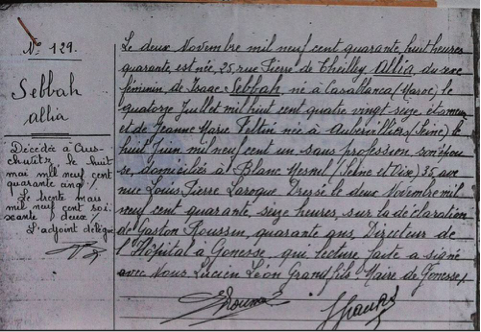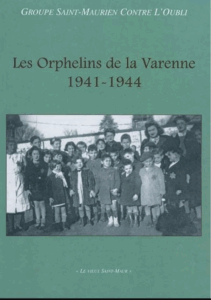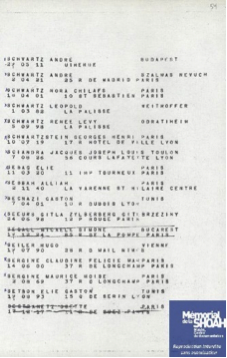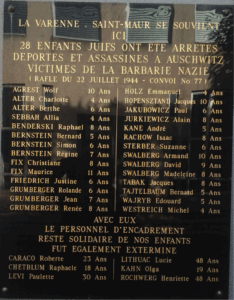Allia SEBBAH (1940-1944)
Allia Sebbah was born on November 2, 1940 in Gonesse, in the Seine-et-Oise (now Val d’Oise) department of France.
Her parents were Isaac Sebbah, a Moroccan Jew, who was born in Casablanca on July 14, 1896, a tinsmith, and Jeanne Marie Feltin, who was born in Aubervilliers in the Seine-Saint-Denis department of France on June 8, 1901.
They were married on December 23, 1922, in Aubervilliers. Jeanne Feltin was also tinsmith at the time, but she did not return to work after she got married.
Allia was the youngest of their large family: Eliane, born in 1926; Rolande Esther born in 1928 (died in 1998); Albert Roger born in 1930 (died in 1932 in a household accident); Meyer Emile, born in 1931 (died in 2016), all of whom were born in the 12th district of Paris. Then came Roger Joseph, born on September 26, 1932 in the 11th district of Paris; Maurice Isaac, born in 1934 in Blanc-Mesnil (died in 2001), Simon Jean, born in 1937 in Gonesse (died in 2006); Robert, also born in Gonesse on May 1, 1938 (died in 1996).
And last of all came Allia, who was born in 1940, during the Second World War.
At that time, the Sebbah family lived in a small bungalow at 35, rue Laroque in Blanc-Mesnil (now in the Seine-Saint-Denis department).
We do not know if Isaac, Allia’s father, went to register himself as a Jew in October 1940, as required by the collaborationist government’s anti-Jewish legislation. If he did, he must also have registered his children. However, according to the Vichy regime’s anti-Semitic legislation, the children, who, like their father, were Moroccan citizens, would only have been classified as “half-Jews”, because their mother was not Jewish.
Isaac Sebbah was arrested in 1943 and deported on November 20, 1943 on Convoy 62. The Shoah Memorial website lists his date and place of death as November 25, 1943 in Auschwitz (French Defense Historical Service, dossier AC 21 P 537 710). Of the 1200 people who were deported on this convoy, only 1181 arrived in Auschwitz: 19 young people escaped along the way. They had all been involved in digging a tunnel in Drancy, and had been reported to the camp authorities.
After Isaac was arrested, Jeanne was left destitute with all the children to care for. She was unable to manage, so had to send some of them to various children’s homes and orphanages in and around Paris. A social worker in Blanc-Mesnil arranged for Mayer, Robert and Allia to be taken in by the UGIF (Union Générale des Israélites de France, or General Union of French Jews), which took in Jewish children whose parents had been deported, and also children whose families placed them in its care.
The Vichy government, in collaboration with the Nazis, set up the UGIF in November 1941. It replaced all existing Jewish associations and was supposedly intended to provide social assistance for Jews. Although was run by Jews, the “Occupation Authorities” had complete control over it. The UGIF was used as a cover for individual efforts to rescue some Jewish children, but sadly, towards the end of the Occupation, almost all of the children in its care, along with many of the staff, were deported.
The roundup on July 21-22, 1944
Allia and two of her brothers, Meyer/Emile and Robert were sent initially to the UGIF home on rue Secrétan in the 18th district of Paris, and then transferred to the home at 30 rue St Hilaire (also known as La Varenne, or La Varenne Saint-Hilaire), in Saint-Maur-des-Fosses, west of Paris, which had been run by the UGIF since 1943.
A report available on the Internet states that the orphanage could house 20 to 25 children aged 4 to 13. Previously known as the Beiss Yessoïmim Orphanage, it had been run as a nonprofit organization, funded by membership fees, donations, rummage sales and fundraising balls etc. However, in 1941, only a handful of membership fees were still being paid and expenses were hard to meet. Soon afterwards, the UGIF took it over.
On July 20, 1944, Aloïs Brunner, who had been commander of Drancy camp since late June/early July 1943, announced that he was going to arrest all the children in the UGIF homes in retaliation for the assassination attempt on Hitler that had taken place on July 20. However, the real reason was probably that as the American troops were rapidly advancing towards Paris, he had decided to round up and deport as many Jews as possible in the remaining time available.
A few children in La Varenne, including Allia’s brothers, managed to escape on foot with the help of some neighbors with links to the Resistance[1]. Allia, sadly, was not one of them. She was suffering from scabies, which had become infected, so was not able to go with them. She and the remaining children were rounded up on the night of July 21 to 22, 1944.
This roundup caused widespread consternation, as recounted in the book Les Orphelins de la Varenne, 1941-1944 (The Orphans of La Varenne, 1941-1944) by an organization called the Groupe Saint-Maurien Contre l’Oubli, which was republished in 2023.
That night, the SS surrounded the orphanage, intending to take everyone away, but the children panicked and refused to go downstairs, after which the SS opened fire on the building. Soon afterwards, they got in, and 28 children and 5 staff members were taken away by bus.
Allia arrived at Drancy internment camp on July 23, 1944, and was assigned the serial number 25595. She was sent to a “room” on the 4th floor on staircase 8, and then, after spending a short time in the camp infirmary, was moved to the 4th floor on staircase 6.
Killed in the gas chambers at just 4 years old
Allia was deported to Auschwitz on July 31, 1944 on Convoy 77. 1306 people were on board the train, all of whom were deported to Poland simply because they were Jewish. Among them were almost all the children from the UGIF homes in and around Paris, who had been rounded up between July 21 and 24 by Alois Brunner, the Nazi commandant of Drancy camp.
After a short stay in Drancy camp, the children and the other prisoners were taken to Bobigny station. There they were loaded into cattle cars, in which they spent two days and three nights in appalling conditions. All the children, including 18 babies, on this last large convoy from Drancy were sent to their deaths in the gas chambers as soon as they arrived in Auschwitz. Little Allia was among them.
Her official date of death was later declared to be August 5, 1944.
A political deportee
After the war Allia’s mother, Jeanne, completed all the necessary paperwork to have her daughter’s deportation officially acknowledged. In 1955, Allia was granted “political deportee” status. Jeanne was paid just 1,200 francs for the loss of her daughter (the equivalent of around 35 US dollars in today’s money).
In 1962, the High Court in Pointioise pronounced Allia dead, and on March 31 of the same year, her death was registered at the town hall in Le Blanc-Mesnil, which was deemed to be her last place of residence before she was deported.
An analysis sheet, which charts the progress of Allia’s case file since it was first opened, states that her mother was French but that Allia herself was a Moroccan national, as was her father.
An announcement published in the French Official Gazette on September 14, 1991, declared that Allia had “died during deportation”.
Jeanne Feltin Sabbah, whose only income in 1961 was a very low widow’s pension, died on May 30, 1977, in Le Blanc-Mesnil.
Apart from Allia, all her children survived the war, and four of them were still living with her on November 27, 1961, when she told the police investigating officer what had happened to them during the Occupation. Aside from the three she placed in UGIF homes in Paris, they spent that period in Brunoy, a town south east of Paris.
During the 1990s, one of Allia’s brothers, Robert, gave a testimony about the round-up of the Jewish children at La Varenne in 1944.
Allia’s name is inscribed on a memorial in Gonesse, along with those of six other people from the town who died after being deported.
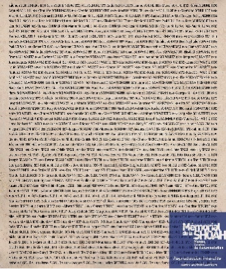
The Wall of Names at the Shoah Memorial in Paris, slab n° 36, column n°12, row n° 3
The Convoy 77 deportation list
The memorial plaque on the former La Varenne orphanage in Saint-Maur-les-Fosses
Source: findagrave.com – Allia Sebbah
In 1991, thanks to the tireless efforts of Nelly Wolf, a former secretary at the Beiss Yessoïmim Orphanage, a commemorative plaque was installed in memory of the children and staff of the UGIF home in La Varenne.
Sources:
Center for Jewish History, UGIF archives – la Varenne
- https://archives.cjh.org/repositories/7/archival_objects/1340115
- https://digipres.cjh.org/delivery/DeliveryManagerServlet?dps_pid=IE13974561
- https://digipres.cjh.org/delivery/DeliveryManagerServlet?dps_pid=IE13974591
- https://digipres.cjh.org/delivery/DeliveryManagerServlet?dps_pid=IE13974604
Paris archives (12th district) AD075TD V11E 0324 0096 JPG
- Alliah S FRAC93007_1W1591_1926_00116
- Alliah S FRAC93007_1W1592_1931_00254
- Alliah S FRAC93007_1W1593_1936_P429
- Alliah S FRAC93007_1W1595_1954_P286
- Records provided by the Convoy 77 team: files on Allia Sebbah from the Victims of Contemporary Conflicts Archives Division of the French Ministry of Defense Historical Service, in Caen, AC 21 P 271867 et AC 21 P 537709, along with a number of records entitled TD from International Tracing Service at the Bad Arolsen archives in Germany
AUB 1E264 – Marriage certificate, 1922, Aubervilliers
1E001/135 – Birth certificates, 1901. (image 103) : https://archives.seinesaintdenis.fr
1926 census of Blanc Mesnil : https://archives.seinesaintdenis.fr
93/86/18 – 1926 census of Blanc Mesnil : https://archives.seinesaintdenis.fr
93/86/19 – 1931 : https://archives.seinesaintdenis.fr
1872W/12 – Tables from 1945
1872W/10 – Tables from 1942 to 1943 : https://www.servicehistorique.sga.defense.gouv.fr
https://archives.seinesaintdenis.fr : death certificate of Albert Sebbah, Allia’s brother
French Ministry of Defense Historical Service, in Caen, Normandy, dossiers AC 21 P 271867 and AC 21 P 537709
- https://www.consistoire.org/lavarenne/lhistoire-de-notre-centre-communautaire
- https://view.genially.com/5e5a7a6c3ca5910fdcf62e45/presentation-les-orphelins-de-la-varenne-juillet-aout-1944
- https://fr.wikipedia.org/wiki/Rafle_de_La_Varenne-Saint-Hilaire
- https://en.convoi77.org/deporte_bio/armand-szwalberg/
- https://en.convoi77.org/deporte_bio/charlotte-alter
“Les Orphelins de La Varenne 1941-1944”, by the Groupe Saint-Maurien contre l’Oubli, published by Le Vieux Saint-Maur Éditeur, 1995
“Les oubliés de Pitchipoï” in Le Mensuel, Blanc-Mesnil magazine, n°29, July-August 1993, pages 14 to 16
[1] This information comes from an interview with Robert Sebbah in Le Mensuel, Blanc-Mesnil’s municipal magazine, in 1993, which was included in the book “Les Orphelins de La Varenne 1941-1944”, by the Groupe Saint-Maurien contre l’Oubli, published by Le Vieux Saint-Maur Éditeur, 1995.


 Français
Français Polski
Polski